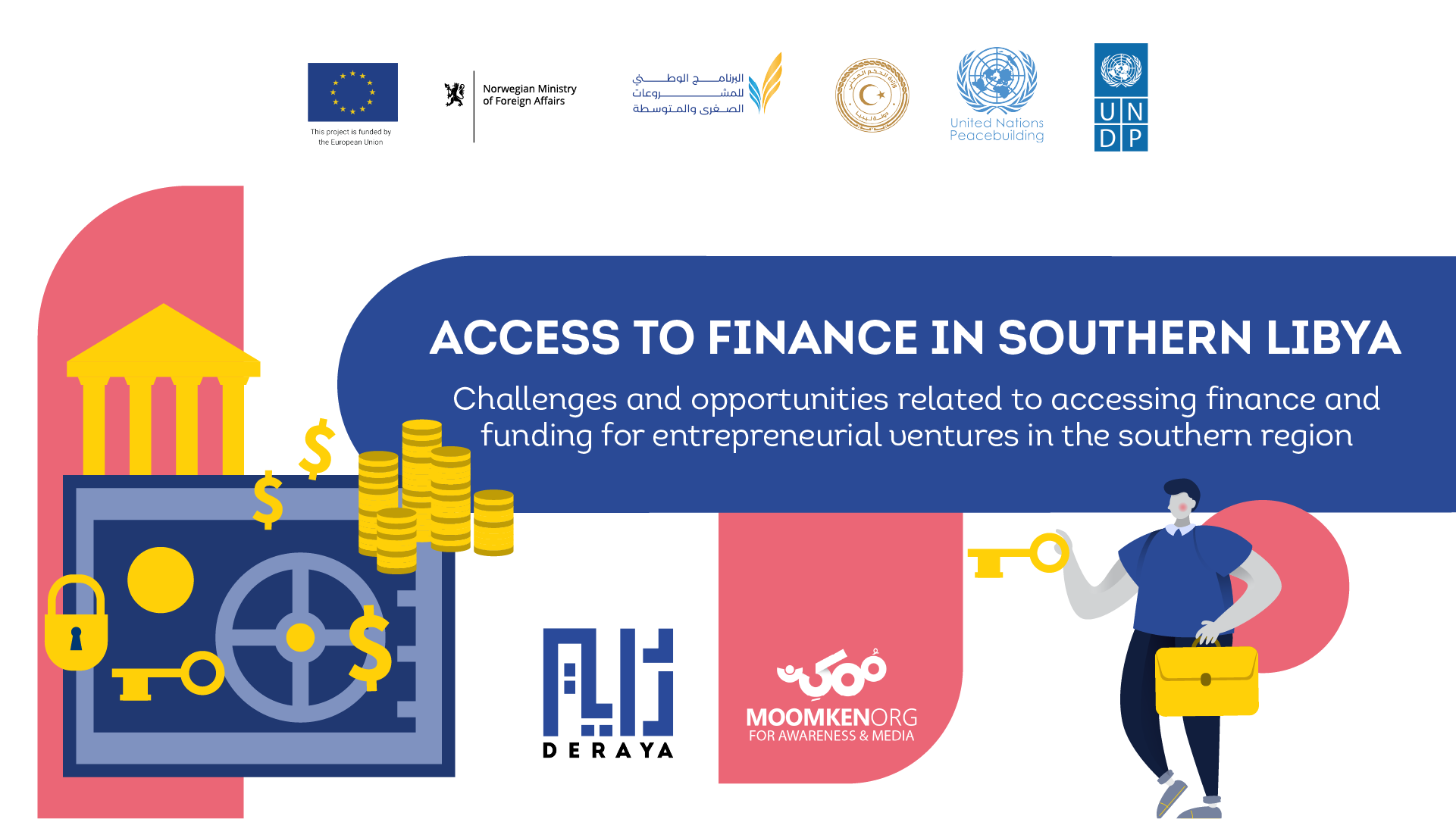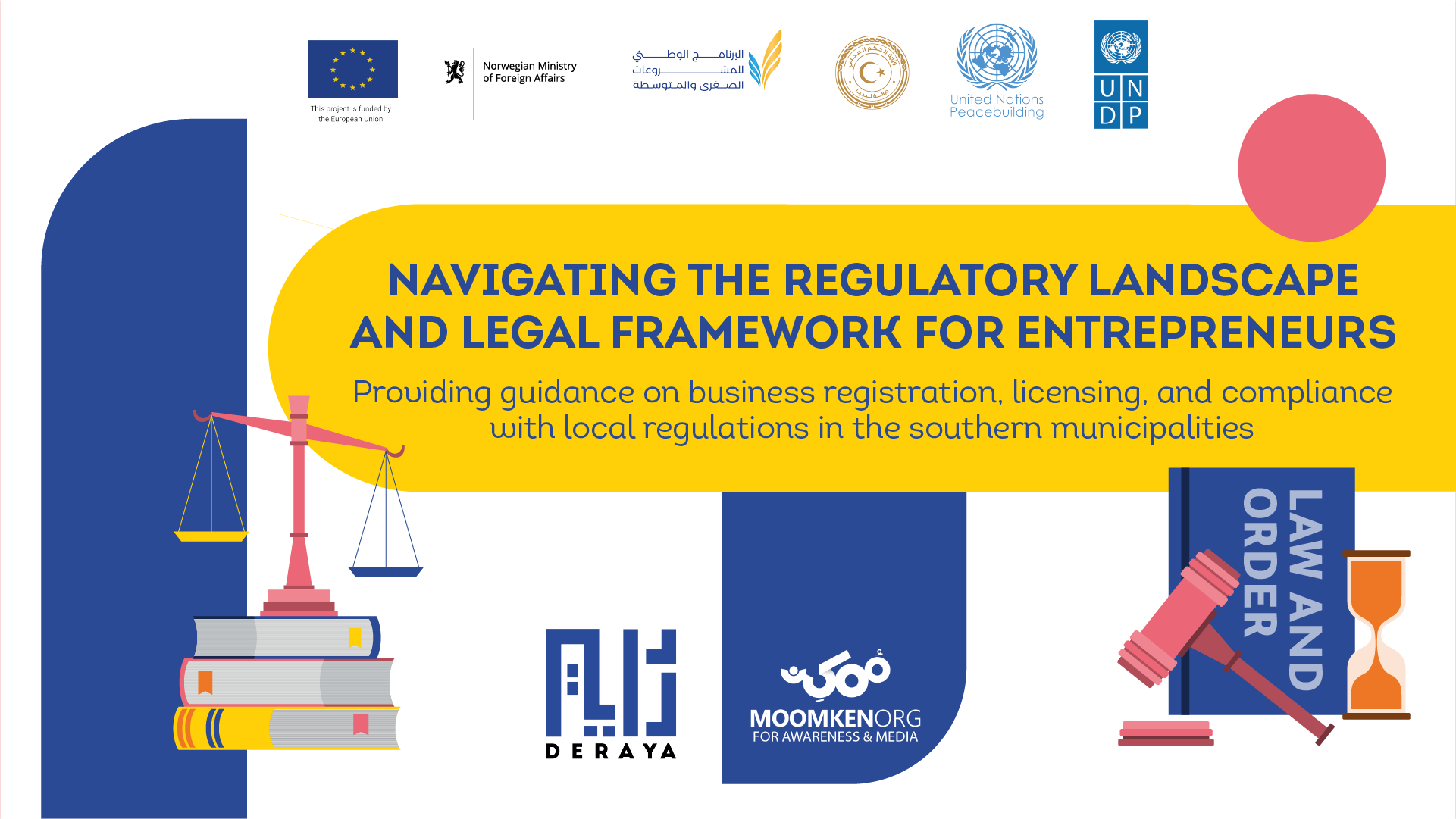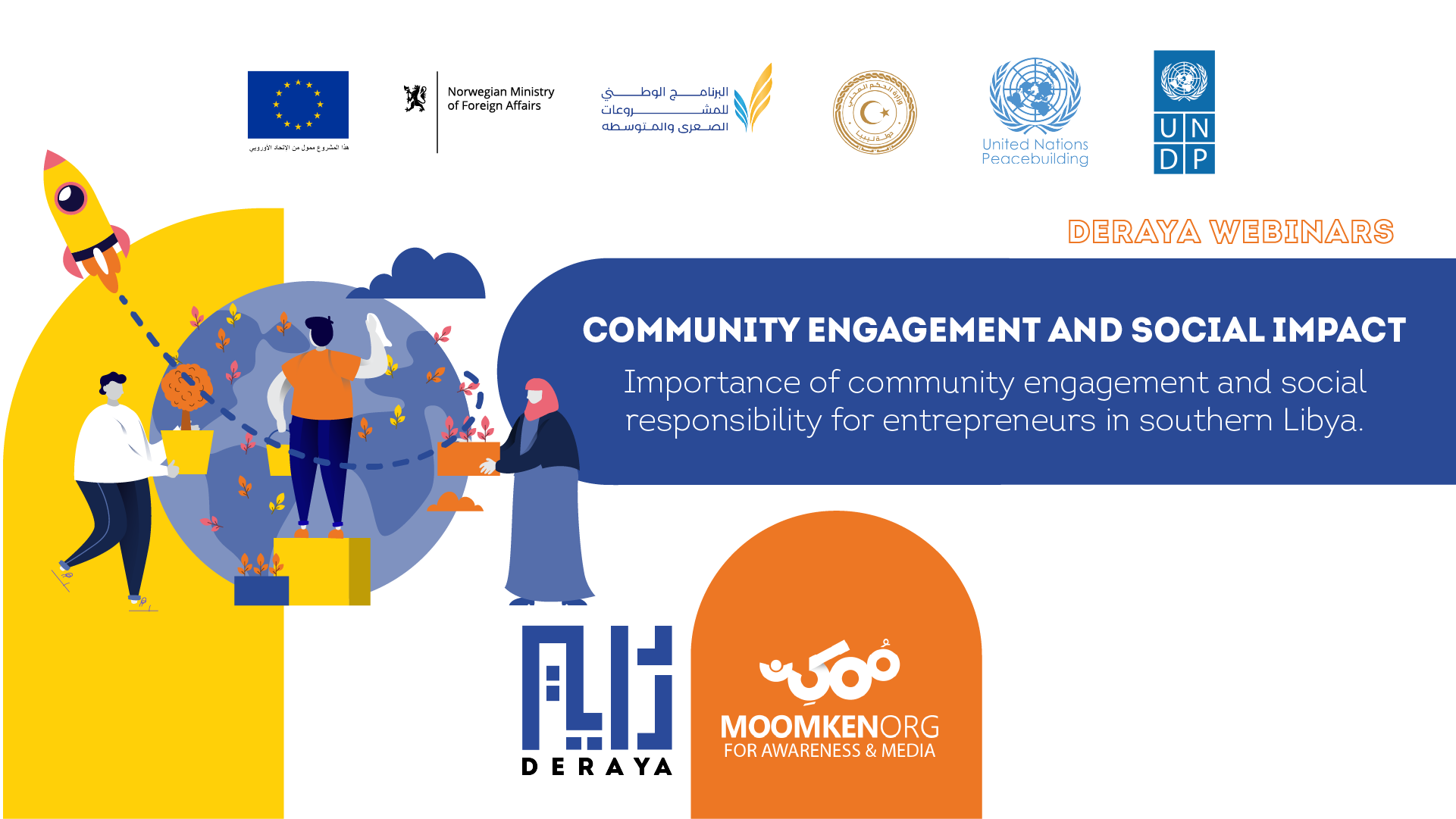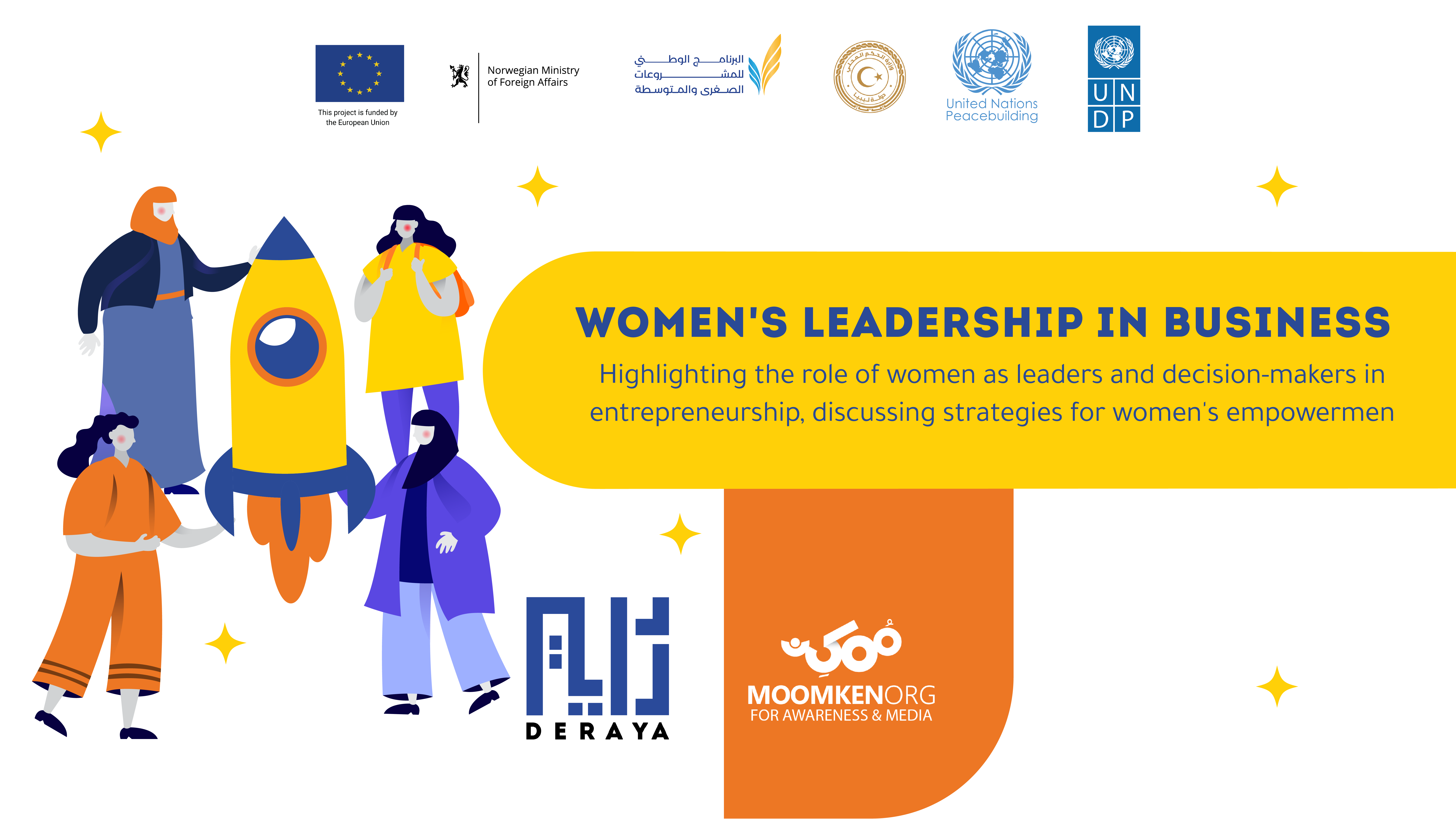Transforming innovative ideas into thriving business initiatives requires funding, especially for aspiring entrepreneurs. Securing financial support through various sources, such as big firms, angel investors, or crowdfunding platforms, is crucial for achieving success, and without adequate funding, even the most promising concepts may struggle to get off the ground and reach their full potential. This funding not only fuels innovation but also empowers entrepreneurs to pioneer new technologies and solutions, disrupting existing industry norms. It also plays a pivotal role in driving economic growth, advancing societal well-being, and creating employment opportunities. By accessing the right financing, entrepreneurs can catalyze sustainable development, fostering a dynamic entrepreneurial ecosystem that benefits both local communities and the broader economy.
In order for businesses in Southern Libya to successfully secure financing, a thorough and diversified plan addressing the unique challenges facing entrepreneurs must be implemented. This should include leveraging local resources, building strong partnerships with financial institutions specialized in SME funding, and providing targeted support and mentorship to entrepreneurs. Enhancing these opportunities involves presenting comprehensive business plans and robust feasibility studies, helping to attract interest and build trust with investors. This case study delves deeper into these approaches which help entrepreneurs in Southern Libya to secure such necessary funding.
The Deraya webinar hosted Nour Alkhamisi from the United Nations Development Programme and Najla Almaslati from Tadawul Capital Company, who shared insights into entrepreneurial financing. They covered strategies for overcoming financial challenges, the impacts of financing on entrepreneurial growth and the potential for a sustainable future.
Challenges in Securing Financing:
Securing financing is a challenge for many individuals and companies due to various factors such as a lack of collateral, limited credit history, a gap between resources and needs, harsh conditions imposed by financial institutions, intense competition, legal and regulatory barriers, and a lack of financial awareness. To overcome these challenges, individuals and companies can seek appropriate financial advice and explore a variety of available financing options, including self-financing, commercial loans, venture capital, grants, partnerships, and crowdfunding.
Najla Almaslati mentioned that “The instability of the security situation in Libya and the general complexities present affect the availability of financing sources such as Microfinance and investment funds, and also impact access to potentially interested investors.”
Nour Alkhamisi also mentioned, “The political and security situation is constantly fluctuating, making it difficult to meet the needs of entrepreneurs with the required skills. I believe that the international community, as well as national entities, whether local governments or ministries, can offer support and assistance to deserving entrepreneurs who need genuine support.”
Financing Opportunities from Local and International Sources:
Financing opportunities vary between local and international sources, each of which can be utilized based on the needs of the project or business. Locally, funding can be obtained from local banks, other financial institutions such as financing companies, as well as support and financing programs provided by local governments, charity organizations, and NGOs. On the international front, funding can be obtained from international banks and financial institutions such as the World Bank and the International Monetary Fund (IMF). Additionally, direct investments from global companies and external financing programs offered by international organizations are viable options. Utilizing a variety of these sources can comprehensively and effectively help in meeting financing needs.
On this topic, Najla Almaslati mentioned, “Opportunities are not limited to men; they are also available to women. The starting point is self-financing, followed by finding a serious investor, which allows the launch of any project. Investors offer great opportunities, especially for women, and encourage them to venture into entrepreneurship. Specifically, the Deraya Project seeks to attract female entrepreneurs motivated by the idea of entering the field of entrepreneurship in the ten targeted municipalities.”
Nour Alkhamisi added, “As a spokesperson for the United Nations Development Programme (UNDP), we operate all across Libya, whether in the east, west, or south. Sabha holds a special status, with all our focus on the south, as it currently hosts the largest project, the Deraya Project, targeting more than eight municipalities with plans to target even larger ones. The south is always included and not, as some may say, marginalized.”
She also added, “The criteria vary from one project to another. Whether it’s entrepreneurship for entrepreneurs or for medium-sized businesses, we work with multiple financing options that differ depending on the type of project. We try our hardest through our role to reach out to all segments of society.”
The Impact of Financing on the Growth of Entrepreneurship:
The ability to access financing is among the most crucial factors in determining a path to success for entrepreneurs. While funding is often seen as essential “fuel” for startups, its impact extends beyond merely covering costs. When directed in an efficient manner, financing can play a pivotal role in driving company growth and achieving strategic goals.
One of the most significant impacts of financing on the growth of entrepreneurship is its ability to enable expansion and business development. By providing sufficient funding to cover operational costs, invest in infrastructure, and hire employees, startups can expand their activities and focus on new opportunities in the market.
In addition, financing can contribute to enhancing the company’s capacity for innovation and development. By investing in research and development, a company can develop new products and services, allowing it to meet customer demand and remain competitive in the market.
Moreover, financing can positively impact a company’s level of confidence and stability, thereby enhancing future growth opportunities and helping to attract more investments and partnerships.
In summary, financing is not only a means of covering costs but instead a fundamental factor in effectively driving the growth of entrepreneurship and achieving long-term success.
Nour Alkhamisi mentioned, “Most measures used as criteria for a program or project have a unique type of diversity in the economy found in the south. Therefore, instead of relying solely on the public sector, the private sector, its income, skills, and learning opportunities, as well as practical experience, are stronger.”
Strategies for Obtaining Financing and Benefiting from It:
Successfully obtaining financing requires adopting multiple, well-crafted strategies. This starts with having a clear vision and pitching a strong and compelling proposal to investors, followed by conducting a thorough analysis of potential risks and rewards associated with the project. Efficiently utilizing technology to enhance access to stakeholders and skillfully negotiating financing terms are also crucial steps. Additionally, there should be a focus on regularly updating and adjusting strategic plans in response to changes in the regulatory and market environment. Building a reliable track record that highlights the project’s ability to deliver desired returns and manage risks effectively cannot be overlooked. By implementing these strategies in a proper manner, the chances of successfully obtaining sufficient financing to support entrepreneurial growth can be enhanced.
Najla Almaslati mentioned, “It’s essential for companies to have a clear project plan before reaching an agreement with investors and financiers, who are interested in seeing self-investment in terms of time, effort, money, and passion from entrepreneurs, rather than just a temporary commitment. They hope to invest in entrepreneurs who exceed their expectations through perseverance, resilience, and discipline, and who can find solutions to their problems.
Nour Alkhamisi said, “Just as the geographical landscape is diverse, so are the existing crises. Therefore, every entrepreneur must possess a clear, forward-looking vision to face future obstacles. The idea behind financing involves both personal benefit and benefiting others, significantly impacting the community. Naturally, there is a societal responsibility towards the community concerning private projects in the south. The widening of impacts is more societal than individual, affecting an entire municipality and the country collectively”
Future Prospects and Sustainable Financing:
For future prospects, sustainable financing is becoming an increasingly important factor in business success. Sustainable finance focuses on balancing economic, social, and environmental factors, promoting sustainable growth and comprehensive development. By adhering to principles of transparency and accountability, it helps build trust among stakeholders and attracts more investments into projects with social and environmental value. The future of sustainable financing involves increased investment in green initiatives and environmental projects, such as renewable energy, clean transportation technology, and sustainable farming. Additionally, sustainable financing aims to support projects contributing to social justice, human rights, and equality. It is equally important to develop new financial tools that enable sustainable financing, such as green bonds and loans carrying a positive societal impact.
Ultimately, sustainable financing serves as a key building block in creating sustainable economies and a better future for everyone.
Najla Almaslati mentioned, “One of the things I hope for is the availability of various financing options for entrepreneurs in Libya, particularly more developmental financing in southern Libya. It is necessary to introduce legislation for investment funds in Libya, with more than one fund available to entrepreneurs, and to facilitate entrepreneurs’ access to investors to support the realization and implementation of their projects. I have noticed that the mindset of entrepreneurs has evolved; the focus is now on expanding projects and ensuring greater success, rather than simply making money.”
Nour Alkhamisi also mentioned, “The international community is currently focused on addressing the real-life issues faced by youth, be they minor or moderate, finding beneficial solutions for entrepreneurs, and ensuring their voices reach the relevant authorities. We hope that in the future, stability is achieved in Libya and permanent policies are formed to directly help citizens.”
In conclusion, providing financing to entrepreneurs in southern Libya clearly requires multiple strategies and continuous efforts. This challenge reflects a collective commitment to supporting and empowering entrepreneurs in the region, encouraging economic diversification, and promoting sustainable development.
To achieve these objectives, the relevant authorities must adopt supportive policies and establish dedicated financing programs to target entrepreneurs in southern Libya. It is also important to strengthen partnerships between the public and private sectors and encourage investors to partake in funding projects.
Additionally, entrepreneurs must develop their presentation and communication skills to capture the attention of investors and secure the required financing for their projects. They should also utilize available opportunities through social networks and business events to showcase their business and gain attention.
With these joint efforts and the commitment of everyone, the entrepreneurial environment in southern Libya can be strengthened, and sustainable economic development that benefits local communities and the entire nation alike can be achieved.
دراسات الحالة الأخري
At the beginning, we must understand that...
The Moomken Organisation hosted Hind Al-Bashari,...






